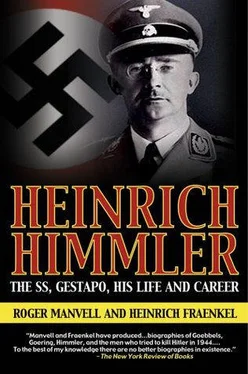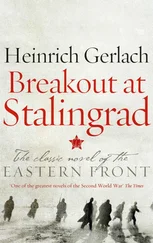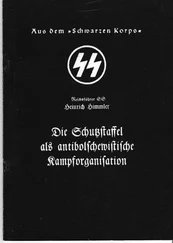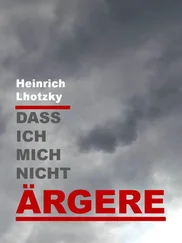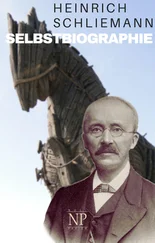In the early months of 1940 Hitler was preparing for the assault on the West. The loss in February of the plans for the campaign against Holland and Belgium — when a special courier who was carrying them made a forced landing in Belgium owing to poor visibility — caused consternation among the Nazi leaders. While Goring raved at the carelessness of the Luftwaffe and dismissed the commander of the Air Fleet whose officer had done the damage, Himmler, according to Schellenberg, was so excited and confused he was quite unable to give clear instructions about the immediate necessity to draw up security regulations for the Army.
Himmler’s military ambitions were still frustrated. The S.S. fighting forces acquired their official title of Waffen or Armed S.S. during the Western offensive, in which only two S.S. divisions served alongside some eighty-seven divisions of the Army. They were given favoured positions in which to display their ruthlessness in battle, while the special armoured S.S. regiment, the Leibstandarte Adolf Hitler under Sepp Dietrich, played as spectacular a part as possible in the fall of Rotterdam and Boulogne. Theodor Eicke’s Death’s Head division made up of German camp guards behaved with shameless ferocity, as the massacre of British troops at Le Paradis in May 1940 showed; the celebrated Private Pooley was one of only two survivors.
But in spite of this activity by the S.S., Himmler seems to have taken no direct part in the campaign, which lasted from April 1940, with the initial occupation of Denmark and Norway, to 21 June, when the conquest of Belgium, Holland and France was complete and the armistice was signed by Hitler in the Forest of Compiègne, a ceremony at which Himmler was not present.
While Heydrich had sprung once more into his Luftwaffe aircraft to enjoy aggression in the field — from which he sent Himmler a postcard on 5 May promising to be back at his desk within eight days — the Reichsführer S.S. trundled west in his armoured train, once more following in the wake of Hitler. He managed to send a letter to ‘Mein lieber Heydrich’ on 15 May explaining that he had spent some days at the Führer’s headquarters and adding, with an ironic reference to the Polish campaign, ‘the only difference is that we are at a different place’. The close of the letter throws some light on his feelings for Heydrich. ‘I think about you very much. I hope everything is going well. And I wish you renewed success, happiness — and everything good. Love from Wölfchen and Haschen. Yours, Heinrich Himmler.’ Then he placed a formal order that Heydrich was to send a daily report by telephone stating what he had done and how he was. Heydrich was to fly with the Luftwaffe until the end of the campaign in June, and be present to enjoy all the fruits of victory in Montmartre. He spent July in the urgent preparation of plans for the control of Britain by the Gestapo and S.D. after the conquest in the autumn. On 27 September S.S. Colonel Professor Dr Franz Six, former head of the faculty of economics in the University of Berlin, was appointed to head the Action Group activities in Britain which would follow immediately upon the invasion.
Meanwhile Himmler was facing certain difficulties in extending his wartime powers. Hitler was determined to restrict the members of the Waffen S.S. to some four divisions (at most about 5 per cent of the armed forces), while Himmler himself was personally committed to such high standards of selection that the average recruit to the German Army fell far below his Nordic ideal. It was during 1940 that Himmler and his sport-and-nature-loving Chief of Staff for the Waffen S.S., Gottlieb Berger, decided that all men of Nordic race might qualify for admission to their forces, whether they were German or not. By the end of 1940 there was a so-called Viking Division in the Waffen S.S. under the German divisional Commander, Felix Steiner, and volunteers from Holland, Denmark, Norway and Finland had begun to join. By the closing months of the war, in 1945, there were thirty-five Waffen S.S. divisions, most of them substantially recruited from the occupied countries. Himmler made his racial theories work in his favour, and they enabled him to fulfil his ambitions of commanding on his own account a substantial body of men separate from the regular Army, over which he exercised no influence except for a few disastrous months during 1944 — 5. In a private memorandum that survives, dated 13 April 1942, Himmler insists that all the German leaders and sub-leaders of these foreign S.S. units must receive special ideological training and report to him personally before taking up their duties. They must, he says, have ‘a firm faith in our ideal’.
On 7 September 1940, Himmler went to France to address the officers of the S.S. Leibstandarte Adolf Hitler at Metz. Only a month before, on 6 August, Hitler had told the S.S. in a speech that their future role was to be that of a volunteer élite force whose duties would be strictly those of a political police, while three weeks before that, from the public platform of the Reichstag, the Führer had shown his favour to the victorious Army by creating twelve new field-marshals. Himmler felt aggrieved and made insidious remarks about the attitude of the Army to the S.S. during the course of a speech in September, the chief aim of which was to state in no uncertain terms the importance of the S.S. to the welfare and advacement of the State, and of the S.D. to its internal security. He knew that many men in the wartime S.S. did not understand the ideals for which he had struggled since 1929, and he realized that the forcible deportations, ‘the very difficult task out there performed by the Security Police supported by your men’, seemed distasteful to some of them. So he went on to tell them why this must be done:
‘Exactly the same thing happened in Poland in weather forty degrees below zero, where we had to haul away thousands, tens of thousands, hundreds of thousands, where we had to have the toughness — you should hear this but also forget it again immediately — to shoot thousands of leading Poles, otherwise revenge would have been taken on us later,… all duties where the proud soldier says: “My God, why do I have to do that, this ridiculous job here!” — It is much easier to go into combat with a company than to suppress an obstructive population of low cultural level, or to carry out executions, or to haul away people, or to evict crying and hysterical women, or to return our German racial brethren across the border from Russia and to take care of them … You have to consider the work of the S.D. man or of the man of the Security Police as a vital part of our whole work just like the fact that you can carry arms. You are the men to be envied because… if a unit achieves fame… it can be decorated. It is much more difficult in other positions… in this silent compulsion work, this silent activity.’ 16
Himmler talked next about the necessity to improve political education in the Waffen S.S., so that the activities of the S.D. would be better understood; they must realize, he said, that the duties of the S.D. man were ‘very, very difficult’, and ‘very, very valuable’. Then he began to tell them of his vision of the future, his dreams of S.S. garrisons ‘safe-guarding the race’ by establishing settlements outside Germany and extending ‘our Lebensraum’ into colonies set up, for example, in South Africa, in the Arctic, and in the West. ‘The first two years of peace will be decisive for our future’, he said. ‘Peace begun with an iron hand… We must start an unheard-of education of ourselves. It is necessary that obedience be granite-like.’ What is done after the war, ‘during Adolf Hitler’s life, will live on for centuries to come… If we make a mistake, the mistake too will live on for centuries.’
Читать дальше
